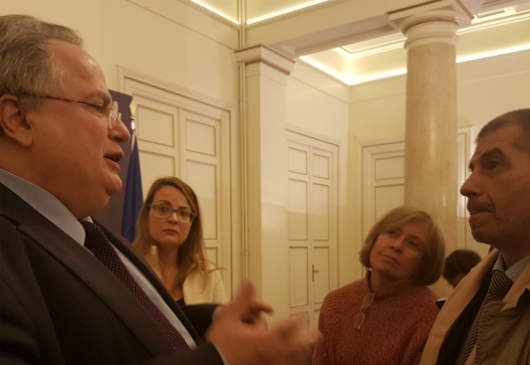 N. KOTZIAS: I met today with the Representative of the UN, Espen Barth Eide. We talked about the course of the Cyprus issue, and in a few days we will be meeting again, in Geneva, supporting the negotiation taking place between the two Communities, while we are also preparing for the International Conference on Cyprus.
N. KOTZIAS: I met today with the Representative of the UN, Espen Barth Eide. We talked about the course of the Cyprus issue, and in a few days we will be meeting again, in Geneva, supporting the negotiation taking place between the two Communities, while we are also preparing for the International Conference on Cyprus.
JOURNALIST: Mr. Eide said that, if it were up to the two leaders in Cyprus, the Cyprus issue would have been resolved, implying that the progress one might have expected has not been made on the matter of security and guarantees.
N. KOTZIAS: Let that issue be raised with those who are blocking its progress.
JOURNALIST: Are you preparing for all possible eventualities? Are you concerned about anything ahead of Geneva? Is there anything that worries you?
N. KOTZIAS: No, I think that it is the obligation of the Foreign Ministry and our government to prepare for all eventualities and be in a position to set out alternative solutions.
JOURNALIST: What might happen if the negotiation fails?
N. KOTZIAS: There is no chance of the negotiation failing. What might happen is for it to be postponed or delayed. There is a difference, you know ... Failure means that a negotiation is stopped without a result. We have received assurances from the UN that the negotiations will be what we call, in international parlance, open-ended; that is, negotiations that, even in the case where they are stopped, will not be considered to have collapsed, but can be continued, with better preparation, in the future.
JOURNALIST: Mr. Minister, are Greece and Cyprus going to Geneva with a common front and common stance?
N. KOTZIAS: We are a common front.
JOURNALIST: ... and the front within Greece, as well?
N. KOTZIAS: I think that in Greece we have managed -- and this was shown by the latest meeting of the National Council on Foreign Policy -- to have a common line, according to which we support Cyprus and we support the position for the elimination of guarantees and of rights of intervention for any country in the internal affairs of Cyprus -- as well as the position in favour of the withdrawal of the occupying army.
JOURNALIST: So, Mr. Minister, are you telling us that -- in our assessment -- the international Conference may be postponed, not take place?
N. KOTZIAS: No. The international Conference will take place, but at some point it may need to be stopped and continued later on. It won't be a disaster for it to stop, but a part of the process. That is, the three leaders may talk and provide general guidance, with the discussion continuing on the level of experts. But the three leaders may work things out from the very first moment. We will see. But I want to underscore that if the negotiations stop being carried out in one form and are continued in another, this doesn't mean that the Conference failed or foundered. This is what we wanted to ensure, so that we don't have the phenomena we had some time ago in Switzerland.
JOURNALIST: Do you have assurances that all of the key players will come; that is, Mrs. May and Mr. Erdogan?
N. KOTZIAS: I imagine that Mrs. May will be participating, but I will be sure tomorrow, when I meet with the UK Minister of State for Europe and the Americas, who is handling the Cyprus issue on the part of the British government. I would also like to say that the UK Foreign Secretary has asked that we dine together in London, between my trip to New York and my trip to Geneva.
JOURNALIST: Will Mr. Erdogan be participating in the Conference?
N. KOTZIAS: Mr. Çavuşoğlu gave public assurances that Mr. Erdogan will be in Geneva.
JOURNALIST: Will a Tsipras-Erdogan meeting take place, after all?
N. KOTZIAS: A great many meetings are taking place -- meetings preparing the dialogue that will take place on the level of leaders, whether before or during the Geneva Conference.
January 5, 2017


